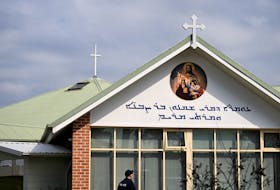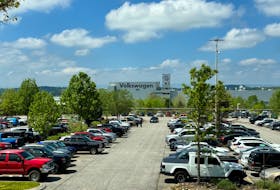That was just one positive in the year highlighted during the Deer Lake Regional Airport Authority’s annual general meeting at the Holiday Inn Express on Tuesday night. In addition to the board, six people attended the meeting.
The record in traffic was mentioned in reports from board chair Walter Dominie and president and CEO Jamie Schwartz.
Another bright spot was the $360,768 profit the airport made last year.
But with the positives, there is some cause for concern.
After nine months of passenger traffic exceeding or nearly meeting traffic levels from 2014, the airport started to see a downward trend in the numbers in the last three months of 2015.
Seven charter flights that once operated on a daily basis back and forth to the oil patch have all disappeared.
“There’s no doubt that the low oil and what’s happing in the economy in Alberta, Newfoundland and Saskatchewan, in particular, will impact the number of people that travel to and from Deer Lake,” said Schwartz after the meeting.
“But there are some bright spots as well,” he said. The airport is anticipating a very strong tourism season in 2016. And the number of commuters to and from Muskrat Falls is also beginning to increase.
“So those will help offset any loss of traffic.”
Dominie also pointed out that other increases in service that the airport has seen over the past couple of years gives people more options and helps with traffic levels.
As for what the drop in oil travel will mean for the airport’s bottom line this year, Schwartz said it’s not all bad news.
“From a financial perspective we may not be anticipating as high a surplus as in previous years, but we’re still anticipating we’ll be in the black and we’ll have a healthy financial statement.”
Even though the airport may not have much control over what happens in the oil industry, there are things it can do when traffic numbers slide.
“On the revenue side we could try to stimulate the market somehow, and airlines will do that as well.”
He said it’s not unusual in downtimes and slower traffic times to see seat sales and advertising to help encourage people to travel. Sometimes the airport will advertise on its own and sometimes it will partner with the airlines.
From an expense side, the authority has more control over what happens and can look at its costs to find ways to save.
It’s capital program is one area that it may look to and this could include putting off projects for a year or two.
“We’re very fortunate that our infrastructure now is in very good shape,” said Schwartz, adding that capital costs have reduced significantly over the past few years.
“We did the big projects quite some time ago and, if anything, we’re in a really good position financially to move forward.”
That was just one positive in the year highlighted during the Deer Lake Regional Airport Authority’s annual general meeting at the Holiday Inn Express on Tuesday night. In addition to the board, six people attended the meeting.
The record in traffic was mentioned in reports from board chair Walter Dominie and president and CEO Jamie Schwartz.
Another bright spot was the $360,768 profit the airport made last year.
But with the positives, there is some cause for concern.
After nine months of passenger traffic exceeding or nearly meeting traffic levels from 2014, the airport started to see a downward trend in the numbers in the last three months of 2015.
Seven charter flights that once operated on a daily basis back and forth to the oil patch have all disappeared.
“There’s no doubt that the low oil and what’s happing in the economy in Alberta, Newfoundland and Saskatchewan, in particular, will impact the number of people that travel to and from Deer Lake,” said Schwartz after the meeting.
“But there are some bright spots as well,” he said. The airport is anticipating a very strong tourism season in 2016. And the number of commuters to and from Muskrat Falls is also beginning to increase.
“So those will help offset any loss of traffic.”
Dominie also pointed out that other increases in service that the airport has seen over the past couple of years gives people more options and helps with traffic levels.
As for what the drop in oil travel will mean for the airport’s bottom line this year, Schwartz said it’s not all bad news.
“From a financial perspective we may not be anticipating as high a surplus as in previous years, but we’re still anticipating we’ll be in the black and we’ll have a healthy financial statement.”
Even though the airport may not have much control over what happens in the oil industry, there are things it can do when traffic numbers slide.
“On the revenue side we could try to stimulate the market somehow, and airlines will do that as well.”
He said it’s not unusual in downtimes and slower traffic times to see seat sales and advertising to help encourage people to travel. Sometimes the airport will advertise on its own and sometimes it will partner with the airlines.
From an expense side, the authority has more control over what happens and can look at its costs to find ways to save.
It’s capital program is one area that it may look to and this could include putting off projects for a year or two.
“We’re very fortunate that our infrastructure now is in very good shape,” said Schwartz, adding that capital costs have reduced significantly over the past few years.
“We did the big projects quite some time ago and, if anything, we’re in a really good position financially to move forward.”








